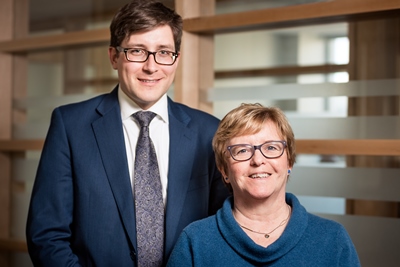
Next winter, Queen’s Law will be offering the International Trade Law Practicum, an exciting new clinic-style course that will allow JD students to cut their teeth on real problems in the field of global trade law.
The course will be co-taught by Professor Nicolas Lamp and adjunct professor appointee Valerie Hughes, who most recently served as Director of the Legal Affairs Division of the World Trade Organization. Students will work with various stakeholders called “beneficiaries” – such as governments, trade associations, small businesses and NGOs – on projects that culminate in a professional quality legal memorandum, brief, draft law, treaty text or other output tailored to the beneficiary’s needs.
“Apart from lectures given by mentors on specific issues, there are no lectures per se; students will start off by working on a specific problem from a real-world beneficiary,” says Lamp. “It’s a practice-focused course, in which students are tasked to work on these projects and the instruction is geared towards helping them come up with the best product for their beneficiary.”
The course is being offered as part of a joint University of Ottawa–Queen’s International Trade and Investment Law Clinic, under the umbrella of TradeLab, a Geneva-based NGO and network of legal clinics that brings together an international group of academic institutions and professionals to work with beneficiaries. The Ottawa–Queen’s clinic will join other academic institutions in the TradeLab network, spread across North America, Africa, Europe, India and the Middle East.
Lamp is looking forward to working closely with trade and investment law experts at the University of Ottawa and is especially pleased to have Hughes, who also led the Canadian government’s Trade Law Bureau and served as Director of the WTO Appellate Body Secretariat before her most recent stint at the WTO, on board with the clinic.
“Valerie has been part of the Queen’s International Law Programs at Herstmonceux Castle for many years, and I also knew her from my work at the WTO,” he says. “We knew she was retiring but looking to stay involved and that she likes working with students, so we caught her at the right moment. She has been a huge asset to us in working with the University of Ottawa to get the clinic off the ground, and her involvement really boosts the credibility of the clinic.”
With enrolment capped at 12, the course will test students in their legal skills but also introduce them to career opportunities in the trade law field, allowing them to interact with beneficiaries and mentors in a professional setting. It’s just one part of a larger invigoration in trade law at Queen’s under Lamp’s leadership.
“What’s special about Queen’s is that we offer our JD students opportunities to be involved in trade law throughout their law degree, starting after first year with the Castle Program,” he says. “We now have students who have gone to the Castle, done an upper-year trade law course, mooted and will take the practicum – four points in their law career where they have engaged with international trade law. The practicum is the icing on the cake to put everything they’ve learned to a practical problem a stakeholder out there is grappling with.”
While the prospect of making a real-world impact and closing the gap between beneficiaries and legal services excites Lamp, he’s also looking forward to the chance to work with and learn from engaged students in this setting.
“Personally, as a teacher, it’s exciting to work with teams of extremely enthusiastic and qualified students,” he says. “I get to interact with students in a way that’s different from a normal class setting, and because they do so much research and think about these issues so hard, I also learn quite a bit from the students.”
By Emily Lieffers